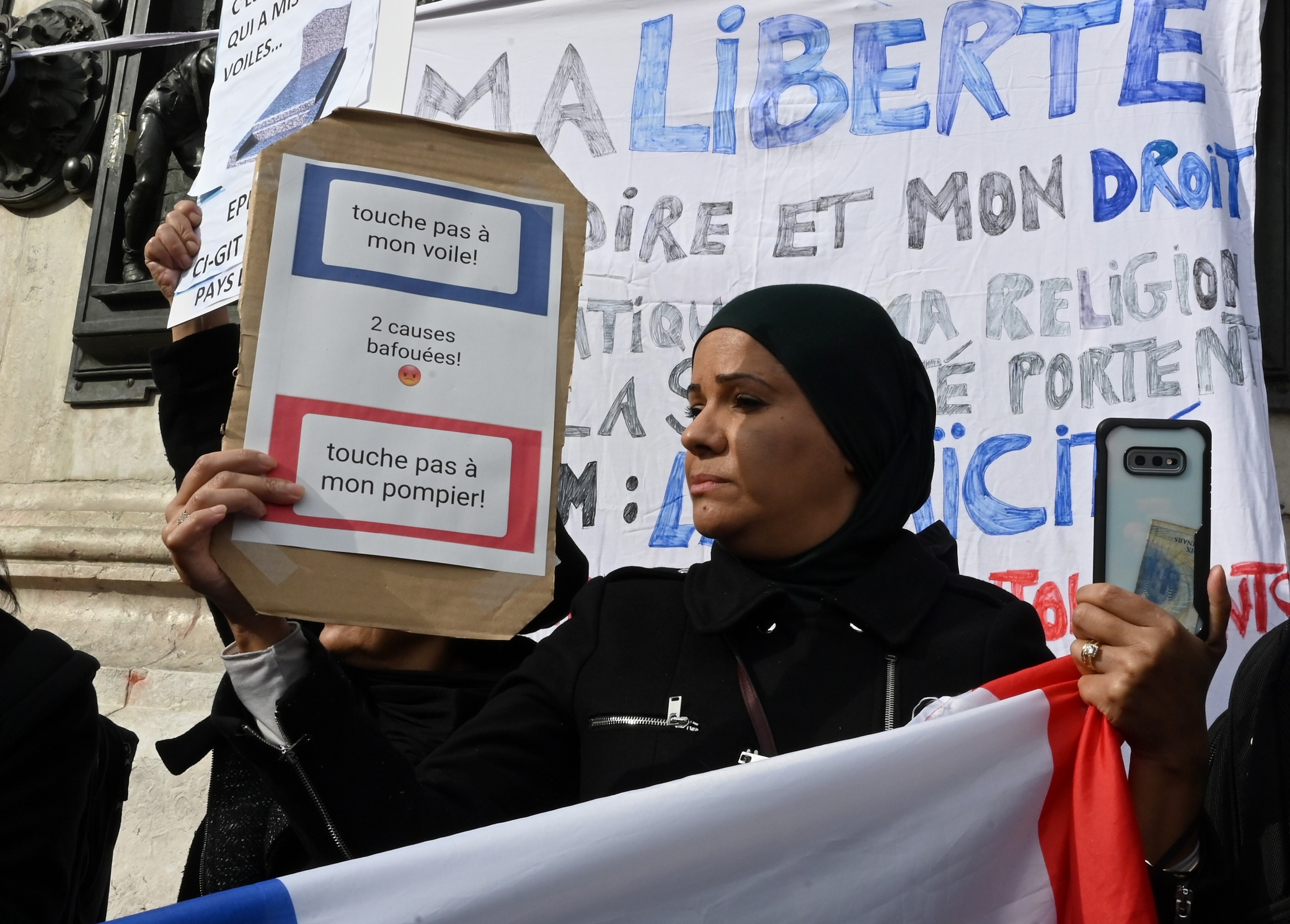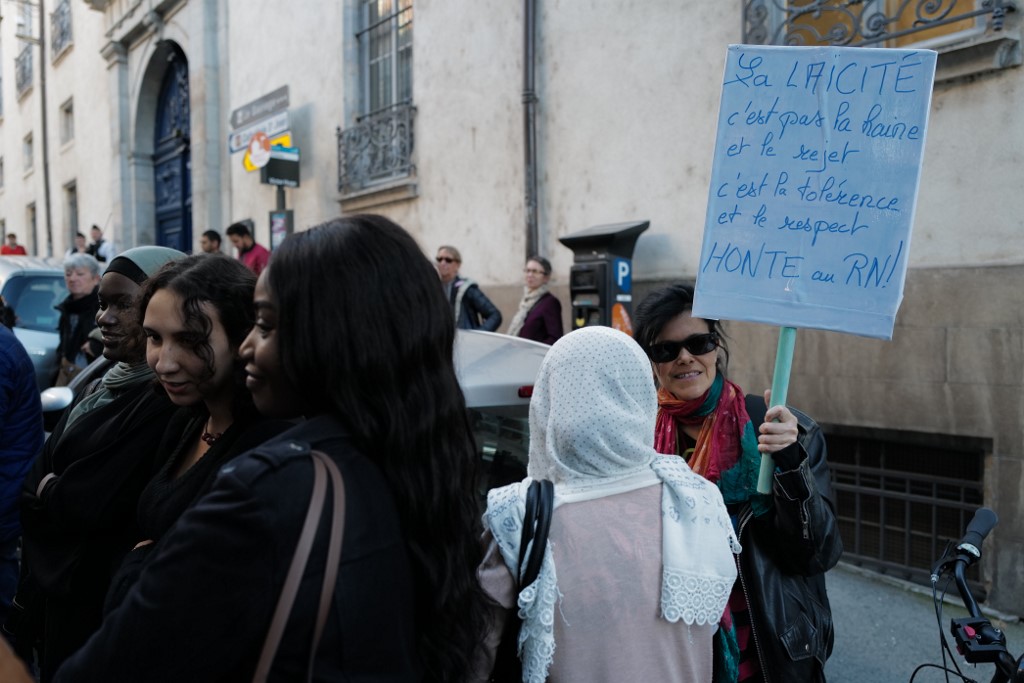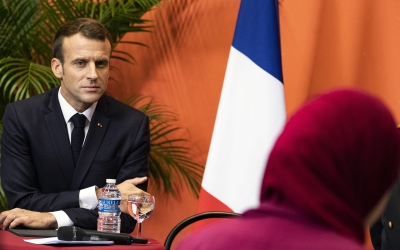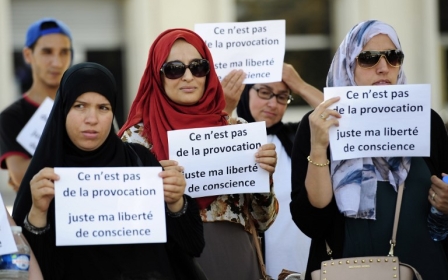French fear and loathing towards Muslim women reveal a deeper malaise

It is significant that the latest vitriol towards the hijab in France has been directed against a mum out on a school trip at the seat of a local government council.
This affair and its aftermath raises a number of key issues: the inculcation into young children of tyrannical notions, such as “loyalty to the republic above all else”; the increasingly futile weapons that secularists will employ, particularly “feminism”; and the hypocrisy of leaders who will grasp at any fiction, including linking a piece of cloth over a woman’s hair to terrorism, to harness the “popular will” required to stay in power.
Amid this is the all-apparent courage and fortitude required to be a Muslim woman and mother in France today.
Tyrannical secularism
France’s current descent into tyrannical secularism is a sign of panic, stemming from deeply rooted notions of what Europeans are educated to believe are “enlightenment” philosophies. Springing from, among others, Jean-Jacques Rousseau’s “social contract”, these philosophies naturally bend towards the populism we see today.
It is essential for those in power to maintain the appearance of having the “general will” behind them, and to this end, they will muster every emotion necessary - in particular, hatred of Islam, which calls for a divine-centred system of accountability and behaviour that places others above the self.
The necessary, wholesale hatred of Islam is wrapped up in a global reign of terror, deceptively labelled as the 'war on terror'
The “general will”, as written by Rousseau, has inevitably morphed in our media landscape into what is now known as the “popular will”. The increasingly vocal demonstrations on the streets of France and elsewhere in the world show there is a keen difference between the two.
This philosophy easily took hold under Christian dogma within the limited media environment of the 18th century. Carefully constructed frames of “equality”, “liberty” and “rights” were used to raise the French population into a frenzy, pushing them to violently reject the church.
These notions have long since been shown to be false as far as modern France is concerned, although considering the deplorable treatment of women under the church, it is no surprise that “feminism” has is deployed as a weapon to overthrow divine law.
But in the new republic, the notion of women’s rights was harnessed only to serve the secular system.
Structural violence
Today, behind the terrible shaming and violent treatment of a Muslim woman and her son, is the ongoing structural violence against Muslims and other people who speak out against inequality and injustice, couched in the corporatisation of everything (including war, which must be maintained for the secular system to profit).
There is no accountability for those in power when it comes to their abuse of such people - for the illusion must be maintained that they are always acting for the perpetually manipulated “popular will”.
The necessary, wholesale hatred of Islam is wrapped up in a global reign of terror, deceptively labelled as the “war on terror”. Are those who seek to publicly undress Muslim women - in the same manner as Algerian women were publicly “unveiled” in the 1950s to baying, perverted European generals - to be considered “civilised”?
Many courageous Muslim women have spoken out about why they wear the hijab or niqab, often under interrogation by “feminist” news hosts and other confused people at borders.
By now, it should be clear that they do so out of obedience to their creator, and not to men. It is not a “sign of resistance” or an “assertion of political will”; this is an attempt to assign secular notions to what is firstly an act of obedience to God.
This is a fundamentally liberating position, one that rests in the heart and that no man can touch, even if he claws at the cloth on the street, or demands from a gallery of pompous and cowardly manipulators of “popular will” that she undress herself.
In the long run, such acts only portray the brutality of the attackers and contribute to their decline.
Looking in the mirror
The more this happens, the more the “feminist argument” that the niqab or hijab as a form of “submission” to men is shown to be obsolete and absurd.
This brings to mind the case of award-winning French novelist Michel Houllebecq, who was brought to court on charges of Islamophobia in 2000 - but he refused to apologise, saying that France was a secular country and he was “free to insult a religion”.
And yet, his 2015 novel Submission hypothesised a not-altogether unpleasing, but highly unsettling, future Muslim France - more unsettling, since it was published the day of the Charlie Hebdo shootings. His most recent novel, Serotonin, in the words of critic John Waters, details “the strange death of a Europe that never really existed”.
“A civilization dies, says Florent-Claude Labrouste, the protagonist … ‘without worries or danger or drama and with very little carnage; a civilisation just dies of weariness, of self-disgust,’” Waters notes in his review.
Houllebecq’s caustic summaries of the secular condition, the chief casualty of which are humans themselves, includes disturbingly emotionless accounts of fornication, bestiality, child pornography and other modern sicknesses - the terrible endpoint of the endless worship of human “will” as a source of power.
Reading his work is not pleasant, but it is thought-provoking for those courageous enough - like Houllebecq - to look squarely in the mirror. His male characters are bored, castrated of their prowess and discernment by a system that allows anything, but demands no argument - only the endless, numbing co-operation with desire, and a congruent passivity in the face of predictable moral descent.
The French dilemma
In their unravelling, these characters make visible the gruesome reality of the world man has made in his determination to become his own deity.
A New York Times reviewer astutely observes that although Houllebecq has been the darling “Islamophobe” of the intelligentsia, popular mainstream and far-right, the main character in Submission appears to long for “faith in its purest form … directed beyond the human to the divine, the truly sacred … [which] is nothing other than itself”.
Your violence throughout history has not been directed at her, though she has taken its brutal knocks
In the London Review of Books, Adam Shatz goes further, describing France’s literary star as a disappointed mystic, who “writes about Islam with curiosity … even a hint of envy”.
“For Houellebecq, France’s dilemma resembles his own: France has attempted to replace God with the secular religion of republican citizenship and laicite … [which] has left France without a sense of direction or purpose,” Shatz notes.
So look, dear France and Europe, at the arresting and unambiguous figure of the covered Muslim woman. Understand that you hate her because she is utterly separate from, and unperturbed by, the obedience to human will and desire that you have been taught to worship and commodify. Feel her God-centred beauty and power.
As the years go by, you must realise that your violence throughout history has not been directed at her, though she has taken its brutal knocks. It has been, and is, directed only at yourself.
The views expressed in this article belong to the author and do not necessarily reflect the editorial policy of Middle East Eye.
Middle East Eye propose une couverture et une analyse indépendantes et incomparables du Moyen-Orient, de l’Afrique du Nord et d’autres régions du monde. Pour en savoir plus sur la reprise de ce contenu et les frais qui s’appliquent, veuillez remplir ce formulaire [en anglais]. Pour en savoir plus sur MEE, cliquez ici [en anglais].







